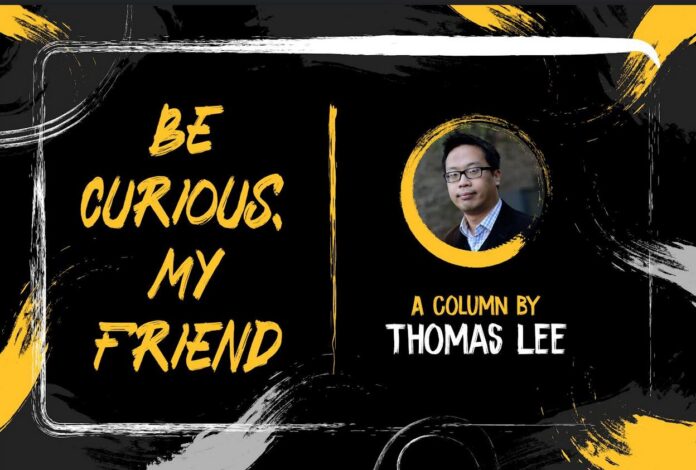By Thomas Lee
Journalists are known for their gallows humor and this author is no exception.
It was November 2016, the day after Donald Trump was elected President of the United States. I trudged into the newsroom at the San Francisco Chronicle and saw my friend, who is Filipino, already at his desk.
“Well, I call top bunk,” I said to him.
It took him a second to process my joke but he then started to laugh.
“Too soon?” I asked.
“Too soon,” he said grimly.
For those of you who didn’t get the quip, I was referring to the prospect of being sent to an incarceration camp, which is what happened to millions of Japanese Americans during World War II.
Trump’s bellicose language about immigrants and China made me wonder if history could repeat itself.
After Japan’s sneak attack on Pearl Harbor, President Franklin D. Roosevelt issued Executive Order 9066, which authorized the U.S. military to indefinitely and without due process detain Japanese Americans who live on the West Coast in desolate camps. The rationale was these U.S. citizens represented a potential national security threat because of their ancestral links to Japan.
The camps represent one of the worst mass violations of civil liberties in American history. Over the ensuing decades, the U.S. government rescinded the order, apologized, and compensated the detainees and their families.
But what most people probably don’t know is that in the immediate decades after World War II, the threat of mass detention camps remained alive and well. Only this time the danger came from Communists, Black civil rights activists, Vietnam War opponents and anyone else during the turbulent 1960s the government thought threatened national security.
In 1946. Roosevelt suspended Executive Order 9066 and released the camps’ detainees. But four years later, during the Red Scare, Congress passed the McCarran Internal Security Act, which required Communist organizations to register with the federal government. The law also allowed for the investigation and deportation of immigrants accused of promoting Communism or engaging in subversive activities.
But the law’s most controversial provision was the emergency detention statute, which gave the President the power to apprehend and detain “each person as to whom there is a reasonable ground to believe that such person probably will engage in, or probably will conspire with others to engage in, acts of espionage or sabotage.”
Sound familiar? In fact, the McCarran Internal Security Act is often nicknamed “The Concentration Camp Act.” The proposed law was so controversial that President Harry Truman vetoed the bill, calling it “the greatest danger to freedom of speech, press, and assembly since the Alien and Sedition Laws of 1798,” a “mockery of the Bill of Rights” and a “long step toward totalitarianism.” But Congress overrode the veto and McCarran became law.
In the late 1960s, Japanese Americans joined forces with Black Americans during the heat of the Vietnam War to campaign against the detention law. By then, the FBI under director J. Edgar Hoover had already been investigating groups it deemed hostile to the American way of life, including civil rights leaders, the Black Panthers, and the anti war movement, which the agency suspected was run by Communists.
“The public historical memories of Japanese American inceration greatly influenced support for repeal in Congress and among the American public,” Masumi Izumi wrote in the Pacific Historical Review journal.
“Civil rights and antiwar protesters both feared that such a law might be used against them (just like) Japanese Americans had been interned during World War II,” Izumi wrote. “Their presence in the repeal campaign made the question of detention starkly real and the need for repeal persuasive. Conversely, their work for repeal allowed them to address a painful part of their American experience and speak publicly as a community.”
In 1971, President Richard Nixon signed a law that repealed the detention provision. But McCarran remains on the books to this day.
It’s not too hard to imagine the prospect of detention camps to emerge again. The United States is a fairly predictable country. Whenever the country is attacked, whether from Japan during World War II, or Al-Qaeda during 9/11, Americans indulge in their worst fears about “foreigners,” whether U.S. citizens or not, coming to destroy our society and way of life.
It was just four years ago when President Trump consistently referred to Covid-19 as the “China virus” and people accused Asian Americans of spreading the virus. Asian Americans, who were told to go home to China, were beaten, robbed, and spat upon.
And lest we forget, a war between the U.S. and China over Taiwan remains a real possibility. How will this country react when China starts killing American soldiers and Chinese hackers sabotage U.S. infrastructure in our homeland?
Under the guise of protecting national security, will the U.S. government distinguish between China and American citizens who are of Chinese descent? How did that work out for Japanese Americans in 1942?
Asian Americans can easily find themselves behind barbed wire once more. Laws, even ones that we have already repudiated, can easily be resurrected from the dead.
AsAmNews is published by the non-profit, Asian American Media Inc.
Happy Lunar New Year. We are now 40% of our goal of meeting our $5,000 matching grant challenge with less than 8 full days to go. Every donation will be matched dollar for dollar through February 16 up to $5,000. All donations will go toward fully funding an editor position at AsAmNews and to support our reporting. You can make your tax-deductible donations here via credit card, debit card, Apple Pay, Google Pay, PayPal and Venmo. Stock donations and donations via DAFs are also welcomed.
Please also follow us on Instagram, TikTok, Facebook, YouTube and X.


